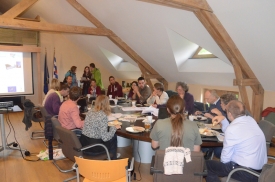News
2014-10-08
Visit of the EU Commission and of Astrale on Belgian and French sites
Beginning of October, the LIFE project and their partners gathered to host the EU Commission and the Astrale office.
The goal of the visit is to control the progress of the project, the respect of administrative and financial rules, the ability to reach initial objectives and the set up of post-LIFE management plans. This visit is organized in addition to annual visits done by the Astrale office to follow the work done in the project.
The program was shared in two days (8 and 9 of October) to have a better understanding of the Belgian and French dimension of this linear LIFE project.
Presentation of the project progresses
First of all, the team presented the progress of the project and the actions led since 2011. This moment was to occasion to share our main difficulties, the way we found solutions to overcome them, benefits of the project and perspectives.
Most of our daily partners were attending the meeting : our steering committee, Elia representatives (from asset management, environment and communication Department), staff from the Department of Nature and Forests (from central and local offices).

Field trip in 3 sites in Belgium
During the afternoon with visited different sites located in the south of Belgium, in the Luxembourg province :
- In the public forest of Martelange first with an orchard plantation of wild apple and pear trees and the project of a double-lined corridor pasturage by local farmers.
- In the municipal forest of Attert, we visited a previously colonised by alder buckthorn and black cherry, and recently sowed flowering meadow as described in this news.

- In the public forest of Mellier, we visited a corridor managed by a cow pasturage and the plantation of a diversified forest edge.

Local foresters and their superior, the Highland breeder and the Elia line patroller were able to present their respective challenges on the forest corridor management and how the LIFE can benefit for their actions. Speeches made clear that even though concerns differ from an actor to another, LIFE action car meet these complementary concerns.
Raising awareness and communication on LIFE Elia-RTE challenges
On 2 different sites, didactic panels were installed to show to the public what are the main challenges of transporting electricity and how the project is striving to integrate biodiversity into the vegetation management. They are located just along walking trails and are essential for raising the awareness of the public.
The press covered the event by broadcasting the LIFE project in the news of the national TV and of a local TV.


Project progress in France
The following day was dedicated to the actions led in France, and more closely to those implemented in the French Ardennes.
Hosted by the Municipality of Sécheval, the LIFE Elia-RTE coordinator presented the progress of French 8 sites of action in front of an audience composed by Municipality deputies, Regional Natural Park des Ardennes representatives, staff from the National Office for forests and from RTE (central services of Paris and services from the East district).

Conventions signature
Conventions were signed between RTE, public forest owner (municipality of Sécheval), the National Office for Forests and the Regional Natural Park of the Ardennes. This will be asset in the long-term vision shared by all partners.

A leaflet created specifically for the Ardennes site of the LIFE was also distributed. It is one piece of our communication toolkit.
Restoration of wetland habitats
The day kept on going with the visit of restoration works on the Mazures forest to see wetlands habitat restorations, ponds and recent soil ripping off.



In the Sécheval forest, a didactic panel located along a walking trail was inaugurated. Dedicated to a large public, this panel illustrate the actions in favour of biodiversity in the area. In 2015, this zone will be planted with wild apple and peer trees, and with forest edges.

The 2 days visit ended in the forest owned by the municipality of Hargnies. A bulldozer was ending restoration works on peatlands : soil rip off to value the existing seedbank, pond digging and building dykes.



Local partnerships : the key of success
We could not lead this project without relying on our local partners, in the Walloon Region as well as in France. Their involvement and commitment are a real support of the LIFE team.















